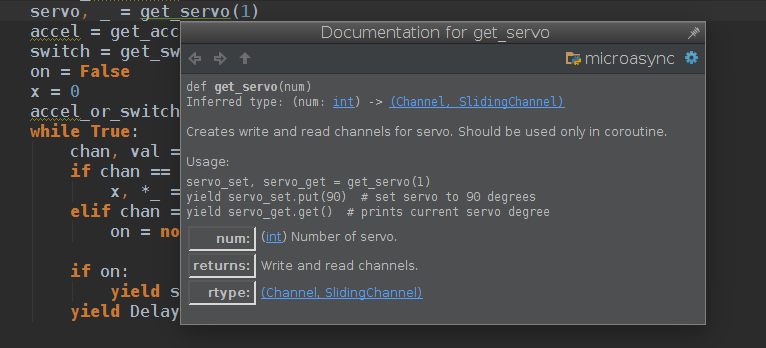Everyone knows that having proper docstrings in code is good, and most straightforward reason why — it’s in-place documentation for classes, functions and methods. So that’s another three reasons:
Sphinx and Read the Docs
For example, we have simple function with docstring:
def as_chan(create_chan):
"""Decorator which creates channel and coroutine. Passes channel as a
first value to coroutine and returns that channel.
Usage:
.. code-block:: python
@as_chan
def thermo(chan, unit):
while True:
yield chan.put(convert(thermo_get(), unit))
@coroutine
def main():
thermo_chan = thermo('C')
while True:
print((yield thermo_chan.get())) # prints current temperature
:param create_chan: Type of channel.
:type create_chan: type[Channel]
:returns: Created coroutine.
"""
def decorator(fn):
def wrapped(*args, **kwargs):
chan = create_chan()
coroutine(fn)(chan, *args, **kwargs)
return chan
return wrapped
return decorator
And using sphinx-apidoc and Read the Docs we can generate cool documentation like this. And it’ll be automatically generated after each push to github.
Quick help in IDE
I’ve been using pycharm, but I think there’s something similar in other IDEs.
Suppose we have function (full source code):
def get_servo(num):
"""Creates write and read channels for servo. Should be used
only in coroutine.
Usage:
.. code-block:: python
servo_set, servo_get = get_servo(1)
yield servo_set.put(90) # set servo to 90 degrees
yield servo_get.get() # prints current servo degree
:param num: Number of servo.
:type num: int
:returns: Write and read channels.
:rtype: (Channel, SlidingChannel)
"""
It’s not simple to guess what it returns and how work with it, but if we just press
ctrl+Q:

Warnings on wrong type and better autocomplete with type hinting
Assume we started writing simple function:
def get_user_groups(user):
"""
:type user: User
:rtype: list[Group]
"""
With type hinting we can use proper autocomplete inside it:

And for result of the function:

And we can see warnings when pass value of wrong type to the function:
